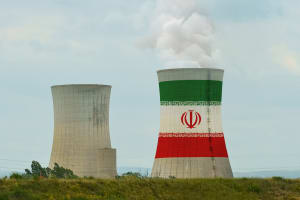Jordan's king warns Israel not to violate status quo of Jerusalem's holy sites

The Jordanian king said he is prepared to act if the status quo of the Temple Mount is changed and said he is concerned about a third “intifada,” or Palestinian uprising against Israel, which typically involves numerous casualties.
Jordanian King Abdullah II warned the incoming Israeli government not to make any changes to the status of what he calls the “red lines” regarding Jerusalem’s holy sites and expressed his concern regarding a possible outbreak of Palestinian unrest.
In a CNN interview aired on Wednesday, Abdullah was asked if he believed the status quo in Jerusalem, including Jordan’s role in overseeing activities on the Temple Mount, was endangered.
Abdullah said it is concerning that there will always be those who try to push the limits.
Jordan sees itself as the custodian of the Temple Mount, which could cause conflict with the new Israeli government, including Jewish Power party chief, Itamar Ben Gvir.
Ben Gvir defends Israel’s right to sovereignty over the mount where King Solomon built the Temple to the God of Israel, and supports allowing Jews to worship on the holy site, which the Jordanian Waqf – the Islamic body that governs the Temple Mount – rejects.
Jews hold the Temple Mount as their holiest site, with much archaeological evidence and the biblical record supporting the existence of the Jewish temples there. The Temple Mount is the location of Islam’s third holiest site, although the site is not mentioned by name in the Quran.
Jordan occupied the Temple Mount for 19 years – until the 1967 Six-Day War – when Israel regained ownership of it after Jordan joined Egypt in attacking the nascent modern Jewish State of Israel.
Despite Jordan attacking Israel, following the war, the Israeli leadership allowed the Jordanian Waqf to act as the religious authority governing the holy site. Under the 1994 Oslo Accords, Israel officially recognized Amman’s “special role … in Muslim holy shrines in Jerusalem.”
Far-right politicians, such as Ben Gvir, have pushed for a change in the status quo, which currently allows Jews to visit the Temple Mount during set times, but not to pray there. Muslims can visit the site at any time.
There is fear that any change could cause repercussions both from Palestinians but also from throughout the wider Muslim world.
Ben Gvir will head a newly created National Security Ministry which will oversee the Israel Police in the new government. The Israel Police sets day-to-day policies at the Temple Mount, giving Ben Gvir significant influence regarding arrangements in this sensitive area.
Netanyahu, however, has insisted his government will maintain the status quo.

The All Israel News Staff is a team of journalists in Israel.














